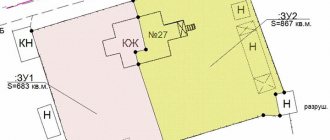Reasons for this procedure
There are two types of grounds for accepting an inheritance - according to a will or according to the law (if there is no will).
According to the will, the successor is anyone; the range of possible successors is limited only by the will of the testator, but in the second case, only the relatives of the deceased inherit, and in a special order determined by law - there are seven lines of possible successors.
The fundamentals of inheritance rights are enshrined in the Civil Code and are currently regulated by Article 1111 of the Civil Code of the Russian Federation.
When transfer of land by inheritance is not allowed
Inheritance is impossible on the basis of the right of perpetual and permanent possession. The use of the allotment ceases with the death of the person who entered into the agreement and does not pass to other people by law or by will.
A land property that is not privatized and is not at the stage of registering ownership rights is not inherited.
If a relative leased the land, then the heir is transferred exclusively to the lease agreement for the specified period. After the end date, the right to use the territory ceases.
Who can be the heir to the land?
According to the rules established for these objects, the following categories can inherit them:
- natural person;
- legal entity;
- municipalities;
- RF.
Attention! Legal entities are successors only by will.
Who can be deprived of this opportunity?
Persons deemed unworthy under Article 1117 of the Civil Code of the Russian Federation are deprived of the right to inherit land. The rules of law define this category as those citizens who deliberately took some actions in relation to the citizen who left the inheritance, other successors or the testator’s own will, and also tried to circumvent the law either to receive an inheritance or to increase their part of the inheritance.
Inheritance by parents is also not allowed if they were deprived of their parental rights (if the testator is their child), and by entities who, during the life of the citizen who left the inheritance, did not take proper actions to care for him.
Video about who can be recognized as an unworthy heir:
What is lifelong inheritable ownership?
If the land is in the lifelong inheritable possession of a citizen, then he can own and use this plot. This right is inherited (Article 226 of the Civil Code of the Russian Federation). At the same time, a citizen cannot dispose of the land: he does not have the right to sell it or donate it. But he can erect buildings on this land, acquiring ownership of them.
Lifelong ownership of land, how to inherit and why to do it are described in detail here.
When does the state accept property?
The state inherits the land in the following cases:
- The express will of the testator to give the plot to the Russian Federation.
- The escheat of the object.
Escheat of property means that after the death of its owner there is no one left who could inherit it.
The rules by which objects are inherited, including such objects, are regulated by civil legislation (Article 1151 of the Civil Code of the Russian Federation). According to the rules of this article, signs of escheat are considered to be the absence of :
- wills;
- legal successors (spouses or relatives);
- absence of successors who have entered into the right of inheritance in fact;
- the presence of heirs, but at the same time they all refused to receive it.
Confirmation of family ties
When inheriting by law, it is necessary to prove family ties. You can only claim the inheritance after this.
Various documents can serve as confirmation: birth and marriage certificates in the first place. These papers are relevant for first-degree relatives.
In addition to documents, oral testimony of people - neighbors, other relatives, acquaintances - can be considered as confirmation.
Oral testimony itself does not play a big role, but it can become a significant addition when resolving the issue through the court.
Forensic examination is also used, which allows us to weigh many nuances - as part of such processes, DNA tests are now carried out and archives are retrieved. Such a detailed approach allows us to eliminate all doubts, and it is usually relevant when transferring the right of inheritance to distant relatives in the event of refusal or absence of relatives of the first and second orders.
The notary checks the degree of relationship and lines up. In a situation where a person cannot prove the degree of his relationship, he can be among the heirs only if each of them agrees with the presence of this person as a contender.
Instructions for legal receivers
Acceptance of an inheritance is possible both with notarial assistance (formally) and actual acceptance in accordance with Article 1153 of the Civil Code of the Russian Federation. Whatever the method of receiving the inherited plot, the need for state registration remains indisputable .
In this case, one should be guided by Article 1181 of the Civil Code of the Russian Federation.
Where to apply for registration?
The actual acceptance of land ownership, transmitted by inheritance, is done by physically taking possession of the land, using the plot for its intended purpose, bearing all costs associated with it, taking care of its preservation and protecting it from outsiders (clause 2 of Article 1153 of the Civil Code of the Russian Federation).
The one who has acquired a share of land in fact will remain so until it is proven by a court decision that this is not so. The owner can declare his intention to the notary and also receive a certificate certifying his ownership.
But for the formal acceptance of the inheritance, notarial assistance will be required (clause 1 of Article 1153 of the Civil Code of the Russian Federation). The successor needs to go to the notary's office at the place where the inheritance was opened (Article 1115 of the Civil Code of the Russian Federation). This should be done no later than the period established by law of six months from the moment of the death of the citizen who left behind the plot (Article 1154 of the Civil Code of the Russian Federation).
A citizen who wishes to accept an inheritance must write an application to the notary and provide the necessary papers, after which the notary will issue him the appropriate certificate.
Required documents
To substantiate and confirm the legality of his claims, the successor must attach to his application submitted to the notary office :
- your identity documents;
- death certificate of the testator;
- certificates of the applicant’s family ties with the former owner of the plot, now deceased;
- a will with the clarification that no adjustments were made to it at the time of opening;
- Form 9 with the residents named in it at a specific address;
- cadastral plan;
- papers on land rights (relevant agreements, certificates, etc.);
- site survey plan with fixation of boundaries;
- evidence of predominant right to the object;
- agreement between successors on division of the object or allocation of shares;
- copying from the cadastral passport with a certain value of the plot.
Important! Since October 2015, there is no need to provide a copy from the Unified State Register, since according to the norm of Article 47.1 “Fundamentals of the legislation of the Russian Federation on notaries”, such data is obtained by employees of notary offices independently.
Thus, the notary can obtain all the information he needs on his own.
Grade
As mentioned above, to carry out the procedure for registering a plot, you need to determine its cost.
This is done by special institutions (appraisal bureaus) at the request of the heirs. At the same time, some groups of successors are exempt by law from paying state fees: these are disabled people of the first and second groups, incapacitated people and minors (Article 333.38 of the Tax Code of the Russian Federation).
The appraisal bureau is contacted at the place of registration of the citizen who left the land. If suddenly it cannot be determined, then the assessment is carried out at the location of the land plot.
You can use the data from the cadastral passport, but only if it was issued within a five-year period, not later.
Drawing up an application
This document reflects the citizen’s intentions to acquire rights. It is filed where the bulk of the inheritance (property) is located. This must be done within six months.
If the successor misses the deadline, but proves that this happened due to extenuating circumstances, the deadline will be restored. In the case of representatives of different queues, the period is only three months. Only if there are less than three months left before its expiration, the period can be extended for another three months.
You need to write the following:
- In the “header”: the name of the notary’s office and its address; from whom the application is made (full name, address (registration and actual)).
- In the middle of the sheet is “Application for entering into an inheritance and issuing a certificate of inheritance.”
- Below describe the situation: when the testator died, where he lived. Which queue is the applicant a representative of, his full name, where he lives.
- What is hereditary property (land plot), description of this plot.
- An expression of intention to accept this site and a request to issue a corresponding certificate.
- At the bottom of the form is the date of submission and personal signature.
Note! The application must be submitted and signed only in person.
Registration of inherited
To obtain state registration, you need to collect the following documents :
- statement;
- the above-mentioned certificate of inheritance;
- agreement on the division of immovable property, if any;
- documents confirming payment of state duty;
- passport of the citizen applying;
- power of attorney – if a trusted person applies.
The certificate will be issued only if this property (house) is registered in the state real estate cadastre. Otherwise, the matter will have to be resolved in court.
Inheriting a share of a land plot
Registration of land that has several recipients does not require the simultaneous application of all applicants. Interested parties submit an application to the local administration. The main task is to obtain permission to divide the land plot among the appropriate number of heirs. Indication of cadastral characteristics and location is required. After receiving permission for the division, the intervention of a geodetic company is required, which must carry out a number of activities:
- topographic survey;
- creating new plans;
- installation of boundary signs at turning points;
- coordination of the boundaries of newly formed areas;
- preparation of land surveying.
After the manipulations with the formed land plots, all that remains is to register the plots in Rosreestr. An application is submitted for reorganization, which facilitates the issuance of new cadastral numbers and the destruction of the old one.
State duty and other financial expenses
Firstly, you will need to pay for notary services upon their provision.
Secondly, before issuing a certificate, a state fee is paid in accordance with tax legislation. The amount of the state duty depends on the value of the real estate itself (land plot) according to experts and on the degree of relationship between the applicant and the deceased testator.
For example, for successors of the first and second stages the state duty is 0.3% of the value of the object, while for more distant relatives it is 0.6%. At the same time, the state duty is limited in size: for the first - 100,000 rubles, for the second - 1,000,000 rubles.
Reference! There are also categories of citizens who are exempt by law from paying such expenses - these are minors and incompetent people and persons who lived together with the deceased. And disabled people of the first and second groups have the right to reduce the state duty by 50%.
For what reasons can they refuse and what to do in this case?
It is possible that a problem may arise when inheriting land. State registration will be denied if there is no certificate of inheritance , which is issued by a notary. And he, in turn, may refuse to issue it if the necessary documents are not provided or there is a dispute regarding the inherited property.
In addition, the notary will refuse to issue a certificate if the statutory period of six months has passed since the death of the citizen who left the inheritance. In all these cases, the notary is obliged to provide a written refusal. In this case, there is nothing left to do but go to court.
If the property is not registered in ownership
If the land plot has not been registered as ownership (for example, the owner did not have time to complete the process of privatization of the land before his death), then it can only be inherited through the court. In this case, the heirs must file a claim with the court to include the land in the inheritance mass. Based on clause 82 of the Resolution of the Plenum of the Supreme Court of the Russian Federation “On judicial practice in inheritance cases,” the court may include land for registration as an inheritance if it was allocated to the deceased :
- for subsidiary, country or personal farming;
- for gardening on the right of permanent use;
- for individual or garage construction.
Reference! If the testator has not started the process of obtaining ownership of the plot during his lifetime, then most likely the court will refuse to include the land in the inheritance.
Read about all the important nuances of how to include an unregistered plot of land in your inheritance here.
Features and nuances
This is a subject of special regulation. Along with the land, the heir also receives everything connected with it : not only the soil itself, but also the vegetation on it and water bodies (if any).
Non-privatized
If the object was not the property of the deceased, then it is not included in the estate. However, the successors can, through a court order, make it property. And if the housing of a deceased citizen is located on this site, then there is the possibility of the successors purchasing this land, after which they can freely dispose of it.
Attention! Non-privatized plots are not inherited, with the exception of unfinished privatization due to the death of the testator. Also, during his lifetime, a deceased citizen could entrust privatization to a third party (trustee).
Farmland
Agricultural plots are inherited according to the rules of Federal Law No. 101 “On the turnover of agricultural land.” Article 11 of Federal Law No. 101 refers to the third part of the Civil Code of the Russian Federation. No additional documents are needed to inherit agricultural land . Article 3 of Federal Law No. 101 indicates what rights foreigners and stateless persons have in relation to inherited lands. And Article 4 of Federal Law No. 101 establishes the rules for the location and size of such plots.
Foreigners and legal entities
In accordance with Article 3 of Federal Law No. 101 “On the turnover of agricultural land,” such persons do not have the right to inherit land.
Since such persons cannot acquire property rights by inheritance, their solution is the right to rent plots. As compensation for the mentioned persons, state compensation is provided for the market value of land plots.
You can also inherit other property. On our website you can read about inheriting:
- auto;
- apartments;
- enterprises;
- cash deposits;
- the funded part of the pension;
- certain types of property.
With the right of unlimited use
This is a restrictive right: the plot can be owned and used, but disposed of (that is, for example, sold) – cannot be disposed of . According to the general rule (Article 417 of the Civil Code), it is impossible to inherit a plot if the testator did not have ownership rights to it. The right of perpetual use can be transferred only if the testator’s house, which was in his ownership, stands on the plot being used.
Grounds for inheriting privately owned land
Before inheriting land, it is important to identify the grounds for succession. There are only two of them: a will and the presence of heirs by law.
A will has priority and allows the testator to leave a plot of land to anyone (Article 1119 of the Civil Code). He has the right:
- indicate in the will specific objects that should go to each heir;
- determine the shares in the inheritance that specific individuals will receive, without specifying the types of property.
Property must be divided in accordance with the will of the deceased, but only if he was of sound mind at the time the will was made.
Entering into an inheritance without a will presupposes the activation of the inheritance procedure according to law. The relatives of the deceased are called to him. Their calling is carried out in turn: the closer the relative, the higher his turn, which means the greater the likelihood of inheriting the land.
The calling is carried out in relation to all representatives of one line, regardless of their number, and the hereditary mass itself is divided equally between them.
If there are none, representatives of the next line are called upon. The law defines the order as follows:
- I – spouses, parents, children;
- II – brothers/sisters, grandparents (in their absence, nephews/nieces);
- III – uncle/aunt (in their absence, cousins);
- IV – great-grandparents and so on.
A separate category of heirs are disabled dependents. According to Art. 1148 of the Civil Code, the degree of their relationship with the deceased does not matter - they can claim a share and be called up with any of the lines of relatives.
Preparation of documents for the house and share
A house located on a plot of land is inherited as two separate objects.
Moreover, they both require mandatory state registration of ownership rights to them. State registration must begin when a certificate of inheritance is received.
This certificate is issued by a notary after the opening of an inheritance case at the request of the successor. In this case, the successor can already live in this house and pay various associated expenses, which will mean actual acceptance of the inherited property.
Inheritance of divisible and indivisible plots of land
When ownership of a land plot is registered, it can be reorganized by dividing it into parts of a smaller area. When carrying out a number of related activities, a certain minimum of standards that are typical for a separate land plot must be observed. Such standards are fixed by the administration of the locality and may vary. More precise requirements can be clarified in the regional land department.
Attention! The division of the total area among applicants must occur subject to full compliance with the documentation on the distribution of shares.
If it is necessary to divide one plot into three or more, the requirements of accepted standards for separately located land property are met:
- new plots should have separate access to the road;
- the presence of overlapping edges is excluded, in full compliance with the boundary boundaries;
- observance of even geometric shapes when forming the area.
Land owned by a municipal organization and without owners belongs to the category of indivisible areas. Such a plot is assigned to the person with the priority right of inheritance. It is permissible to transfer land upon abandonment of property and subsequent assignment.
Video on the topic
Video about the rules and features of land inheritance:
So, in order to legally inherit a plot of land, with or without a house on it, you first need to collect all the necessary papers, write a statement of intent to accept this inheritance and go with them to the notary’s office at the place of the testator’s last residence or, when it is unknown at the address of the inherited plot.
After this, the notary will open an inheritance case, and then issue a certificate of the right to inheritance . Upon receipt of such a document, you can begin state registration. It should be remembered that the plot and the house (if there is one on the plot) are registered separately.
How to join?
In most cases, it is possible to inherit a plot of land without unnecessary complications and litigation. Contacting a notary allows you to resolve almost all issues. However, if necessary, the issue can be resolved in court.
Notarial procedure
In order to receive an inheritance, you must contact a notary.
Each of the heirs must appear before him; 6 months are allotted to resolve the issue, during which all documents must be handed over. There is no point in delaying deadlines or being late; this may lead to the need to go to court for an extension, and here you need to prove a good reason. Often, when deadlines are missed, it turns out that other heirs have already received the property, or it has passed to the state in the absence of other applicants.
Judicial
In case of disagreement, any controversial issues, or missed deadlines, there is the possibility of going to court. This also applies to situations where the testator began the privatization of the land, but did not have time to complete it. Going to court allows you to resolve any difficult issues.





